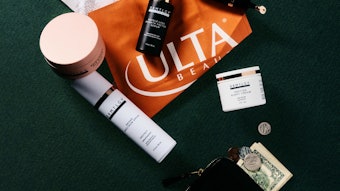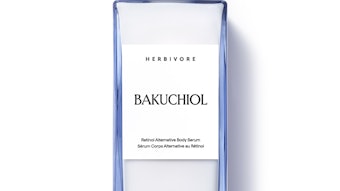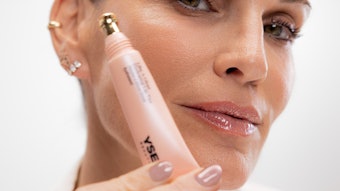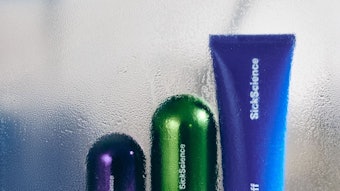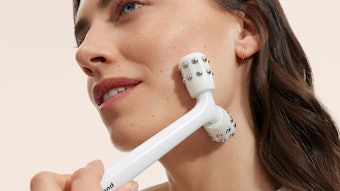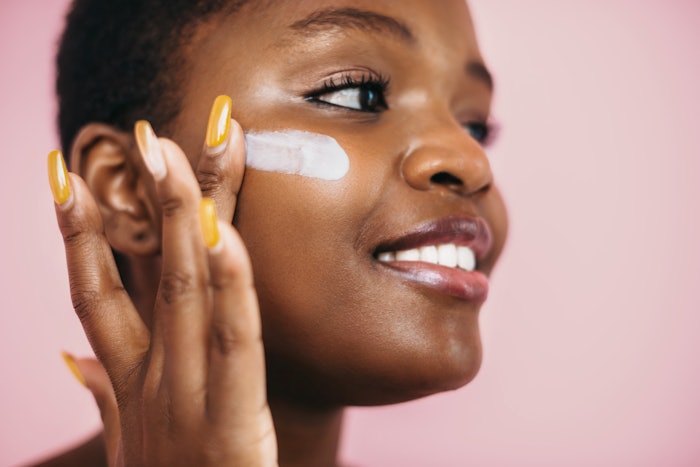
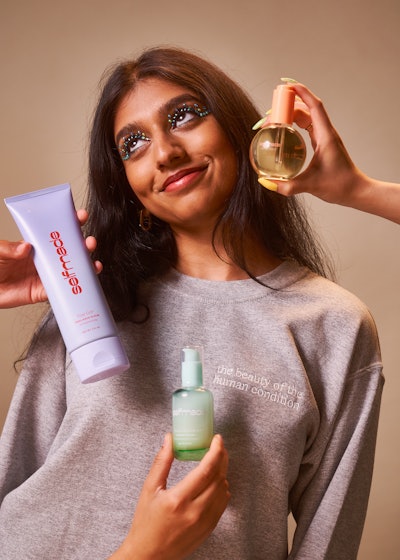 “Our nervous system, which regulates our cognition, mood and body function, and our skin come from the same embryonic layer called the ectoderm when we are in our embryonic stage,” says Stephanie Lee, founder of Selfmade, a brand built on many of the fundamentals of efficacy and psychodermatology.Selfmade
“Our nervous system, which regulates our cognition, mood and body function, and our skin come from the same embryonic layer called the ectoderm when we are in our embryonic stage,” says Stephanie Lee, founder of Selfmade, a brand built on many of the fundamentals of efficacy and psychodermatology.Selfmade
“Our nervous system, which regulates our cognition, mood and body function, and our skin come from the same embryonic layer called the ectoderm when we are in our embryonic stage,” says Stephanie Lee, founder of Selfmade, a brand built on many of the fundamentals of efficacy and psychodermatology. “This means that they are intrinsically connected … Our bodies operate intersectionally and are reliant on each system to keep us alive.”
She adds, “There is no wonder [that] when we experience a stressor, whether internal/emotional, environmental or self-inflicted, that it is going to communicate to us what it’s going through and tell us something is up. Our skin is a mirror to our emotional world, and vice versa. Amazing right? Sometimes it can tell us how we’re feeling before we even acknowledge it ourselves.”
Keira Barr, M.D., a dual board-certified dermatologist and menopause specialist, notes, “Your skin is a window into and reflection of what’s happening beneath the surface in your mind, body and soul … When you’re stressed, your body releases stress hormones like cortisol, which disrupts skin barrier function, triggers inflammation and creates dysbiosis in the skin microbiome, leading to increased skin sensitivity and vulnerability to triggering or worsening of skin conditions like acne, eczema and psoriasis.”
Barr adds, “And it’s a double whammy because your skin has its own HPA [hypothalamus, anterior pituitary gland] axis, which means it’s both a target and a source of the stress response and stress hormones. The presence of those skin conditions can lead to emotional distress, like anxiety or depression, which can further exacerbate skin issues. What’s more is that emotional distress can impact behaviors that may increase skin sensitivity, like poor sleep and nutrition, skin picking or scratching.”
A recent WGSN reportb echoes these findings, noting that lifestyle stretches and environmental antagonists will “contribute to a rise in skin conditions including acne, atopic dermatitis, psoriasis and rosacea.”
Notably, rosacea has become so prevalent that the U.S. National Rosacea Society has launched its own Seal of Acceptance to point sensitive skin sufferers toward appropriate cosmetics.
Products that carry the seal “must be free of ingredients that cause skin barrier dysfunction, vasomotor instability (flushing) or unwanted neurosensory stimulation, such as burning or itching,” per the organization.
The first SKU to earn the seal is the Dermal Repair Cream by Senté. More brands and products are expected to earn the seal on an ongoing basis.
“Sensitive skin will become the new normal,” the WGSN report notes, “and a more gentle approach to skin care will emerge, where products work with the skin rather than against it.”
This movement will favor expert-backed, science-forward innovation with solid clinicals backing up claims.
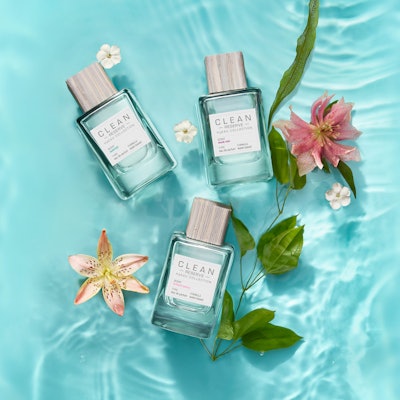 In December 2023, Clean Reserve unveiled its H2Eau collection of eight scents comprising Hydro-Tec micro-emulsion technology that supports the stable mixing of fragrance oil and water, resulting in water-based scents that are compatible with sensitive skin.Clean Reserve
In December 2023, Clean Reserve unveiled its H2Eau collection of eight scents comprising Hydro-Tec micro-emulsion technology that supports the stable mixing of fragrance oil and water, resulting in water-based scents that are compatible with sensitive skin.Clean Reserve
“The consumer doesn’t want to compromise on efficacy,” says Melisa DeGroot, technical writer, Biocogent. “Our customers are looking for science-backed ingredients to add to their formulas that not only cater to sensitive skin but also deliver proven results.”
The impact of sensitive skin concerns has been witnessed far and wide, spanning categories outside skin care. For instance, in December 2023, Clean Reserve unveiled its H2Eau collection of eight scents comprising Hydro-Tec micro-emulsion technology that supports the stable mixing of fragrance oil and water, resulting in water-based scents that are compatible with sensitive skin. This non-irritating effect opens up the world of scent to consumers who might otherwise shy away from the fragrance category.
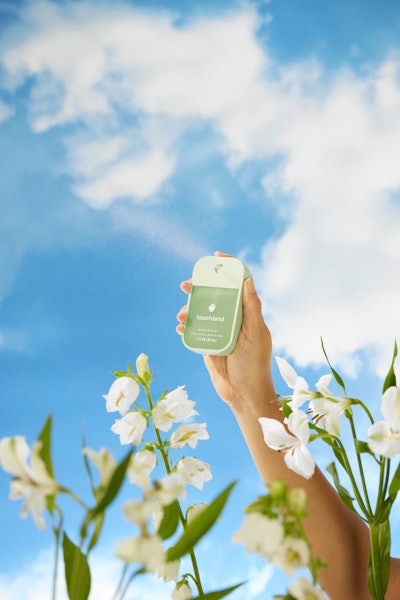 In the hand care/hygiene sector, Touchland has launched a hypoallergenic Gentle Mist SKU at Ulta Beauty, featuring anti-inflammatory madecassoside, squalane, niacinamide, and CODIF’s Areaumat Perpetua to calm and soothe dry and dull skin.Touchland
In the hand care/hygiene sector, Touchland has launched a hypoallergenic Gentle Mist SKU at Ulta Beauty, featuring anti-inflammatory madecassoside, squalane, niacinamide, and CODIF’s Areaumat Perpetua to calm and soothe dry and dull skin.Touchland
In the hand care/hygiene sector, Touchland has launched a hypoallergenic Gentle Mist SKU at Ulta Beauty, featuring anti-inflammatory madecassoside, barrier-supporting niacinamide and hydrating Centella asiatica leaf extract.
Read on to learn how brands and suppliers are innovating to deliver gentle solutions to counteract the top issues for the sensitive-skin majority.
Target: Inflammation
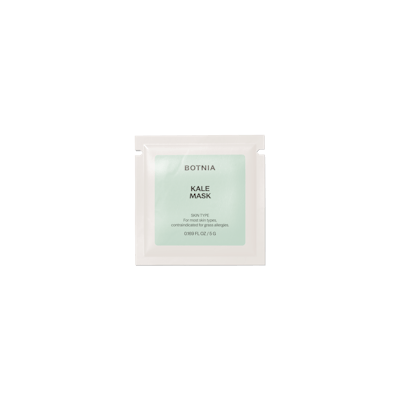 The new Botnia Skincare Kale Mask delivers antioxidant benefits through its vitamin-brightening kale, while it also reduces inflammation and soothes irritation through calming chamomile and oat kernel flour.Botnia
The new Botnia Skincare Kale Mask delivers antioxidant benefits through its vitamin-brightening kale, while it also reduces inflammation and soothes irritation through calming chamomile and oat kernel flour.Botnia
“This is a new kind of skin care active ingredient with the ability to alter several longevity biomarkers to help optimize skin’s overall health and appearance,” explains Ratan K. Chaudhuri, Ph.D., president and CEO, Sytheon. “Its applicability in reducing skin redness was demonstrated clinically by selecting erythema as the primary measure using solar simulated UV radiation. Results showed that when two MEDs were administrated using low or high irradiances to stimulate chronic or acute exposures, the lotion containing 0.5% [Synoxyl] AZ significantly reduced skin redness by 33% and 39%, respectively.”
Synoxyl AZ is a key ingredient in several skin care lines, including Paula’s Choice, Murad and ImageMD, per Sytheon.
Inflammation can mean the obvious—redness of the skin—but it can also refer to neurogenic inflammation that leads to the unpleasant, hypersensitive feeling of the affected skin. Lipotrue recently launched Calisensix, a botanical active ingredient designed to target both issues.
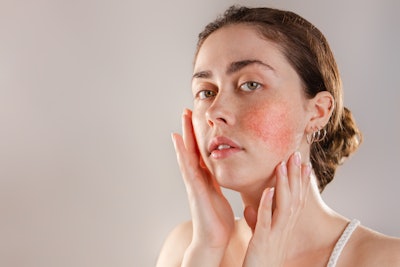 Inflammation can mean the obvious—redness of the skin—but it can also refer to neurogenic inflammation that leads to the unpleasant, hypersensitive feeling of the affected skin._KUBE_ at Adobe Stock
Inflammation can mean the obvious—redness of the skin—but it can also refer to neurogenic inflammation that leads to the unpleasant, hypersensitive feeling of the affected skin._KUBE_ at Adobe Stock
Through in vitro and in vivo testing, Calisensix has reportedly been shown to significantly lessen itchy sensations, soothe redness and calm discomfort.
Consumers dealing with skin inflammation are especially in search of products that won’t exacerbate an already-difficult condition. The new Botnia Skincare Kale Mask delivers antioxidant benefits through its vitamin-brightening kale, while it also reduces inflammation and soothes irritation through calming chamomile and oat kernel flour.
Target: Stress
 CLR Berlin’s new AnnonaSense CLR is designed to simultaneously target sensitive skin concerns and the impacts of stress on the skin.KMPZZZ at Adobe Stock
CLR Berlin’s new AnnonaSense CLR is designed to simultaneously target sensitive skin concerns and the impacts of stress on the skin.KMPZZZ at Adobe Stock
Among volunteers who reported suffering one or both of these issues and who were given a treatment comprising AnnonaSense CLR over four weeks, “35% of participants [who said they experienced stress] reported an increase in positivity, 26% said their sleep quality had improved and 28% felt more calm and relaxed,” per the company.
In addition, “51% of participants with sensitive skin said their positivity had increased, 60% reported an improved quality of sleep and 20% felt that their stress level had reduced.”
Both groups also reported an improvement in the appearance of skin. In fact, skin sensitivity dropped by 67%, while skin discomfort and redness decreased by 54% and 36%, respectively.
Notably, AnnonaSense CLR was said to reduce cortisol stress hormone levels in subjects’ saliva by 33%, revealing a significant stress reduction.
This holistic approach to skin care points to a wider embrace of the mind-beauty axis.
The technology, upcycled from unsuitable cherimoya (Annona cherimola) fruits discarded by Spain’s produce industry, received the Gold Innovation Zone Best Ingredient Award at in-cosmetics Asia in 2023.
Treating sensitive skin, says Selfmade’s Barr, “requires a holistic approach integrating healthy lifestyle choices including a diet rich in protein, healthy fats, antioxidants, good quality sleep, movement, healthy interpersonal relationships and emotional support to help better manage stress and regulate the nervous system.”
She adds, “Centering care and support on nervous system regulation like I do with my Somatic Skincare methodc through body-oriented techniques like somatics, breathwork, and meditation can help release stress, reduce cortisol levels, and minimize skin inflammation, irritation and sensitivity. Creating a skin care ritual that soothes your mind-body-skin through the act of rubbing a product in with a gentle touch which activates the release of oxytocin, the ‘love’ hormone can also be supportive. This is key because oxytocin decreases the production and release of cortisol, our primary stress hormone, which disrupts skin barrier function, increases trans-epidermal water loss and triggers inflammation.”
Choosing a product with stress resisting ingredient actives found in Selfmade’s Corrective Experience Comfort Cream is an added bonus and can help minimize dry, irritated and dehydrated skin.
The bigger picture of using the product is the “care” you are giving your skin and offering to yourself as you apply it. Skincare is about more than the product itself, it’s about slowing down, creating connection with yourself as you apply it and cultivating a felt sense of safety in your skin.
Target: Acne
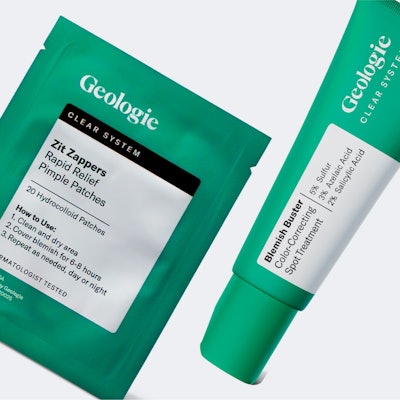 Geologie’s Gen Z skin care, which recently debuted at 800 Target locations across the United States, centers its approach on skin sensitivity. Notably, the brand touts its status as benzoyl peroxide-free. The omission of benzoyl peroxide reportedly minimizes irritation.Geologie
Geologie’s Gen Z skin care, which recently debuted at 800 Target locations across the United States, centers its approach on skin sensitivity. Notably, the brand touts its status as benzoyl peroxide-free. The omission of benzoyl peroxide reportedly minimizes irritation.Geologie
Recently, hair wellness brand Nutrafol expanded into skin care with the launch of Nutrafol Skin, a daily supplement for women ages 18-plus who experience mild to moderate acne.
The formulation targets stress, hormonal fluctuations, microbiome balance across both skin and gut, and immune system function—and how all those factors work together.
The formulation comprises the brand’s patented Synergen Skin Complex, which contains a blend of clinically effective, standardized, medical-grade botanicals formulated in ratios that target the root causes of hair thinning in men and women.
This combination of bioactives addresses stress, hormonal issues and nutrition with adaptogens, antioxidants and DHT-targeting botanicals.
The technology’s functionality has been clinically tested and shown to also reduce mild to moderate acne breakouts and visibly improve post-acne dark spots, per Nutrafol.
Like the Nutrafol launch, Geologie’s Gen Z skin care, which recently debuted at 800 Target locations across the United States, centers its approach on skin sensitivity. Notably, the brand touts its status as benzoyl peroxide-free. The omission of benzoyl peroxide reportedly minimizes irritation.
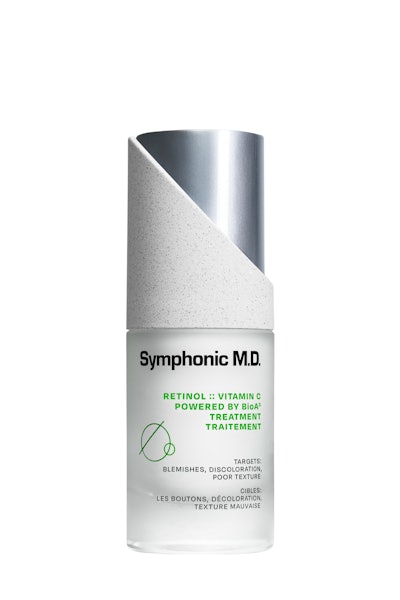 Symphonic M.D. has launched Retinol :: Vitamin C Powered by BioA3 Treatment, a combination of both retinol and vitamin C that can be used twice daily to combat blemishes, hyperpigmentation, clogged pores, and rough texture without sensitivity.Symphonic M.D.
Symphonic M.D. has launched Retinol :: Vitamin C Powered by BioA3 Treatment, a combination of both retinol and vitamin C that can be used twice daily to combat blemishes, hyperpigmentation, clogged pores, and rough texture without sensitivity.Symphonic M.D.
For those with both sensitive and acne-prone skin, ingredient solutions that are powerful enough to clear blemishes without discomfort are of paramount importance. Astrasinol, a hybrid silanol from Exsymol, represented by Biosil Technologies, reportedly ticks both boxes.
“Astrasinol combines biofunctional silicon with a natural blend of soothing extracts, Centella asiatica and astragalus,” explains Philip D. Chung, vice president of sales, Biosil Technologies. “It reduces inflammation and its manifestations, combats and soothes discomfort due to acne, and reduces redness and improves skin texture.”
Plant-derived solutions remain a top choice for those with sensitive skin, and Jojoba Desert’s line of ingredients sourced from the jojoba fields in Israel’s Negev Desert include an option targeting acne control.
“JD Lusteris derived from JD jojoba oil provides an exquisite silky sensory experience, making it an excellent choice for gentle care,” says Jojoba Desert CEO Roni Rot. “Its versatility shines in sebum control, soothing effects, and acne-prone skin improvement.”
Target: Dull, Dry Skin
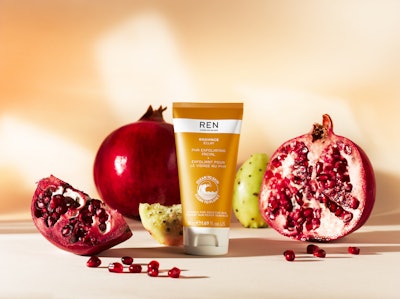 Recently launched by REN Clean Skincare is the PHA Exfoliating facial, a biweekly treatment designed to brighten, soften and refine the texture of even the most sensitive skin. Containing naturally derived PHA, pomegranate enzymes and pomegranate powder, the formula removes impurities, hydrates and brightens the skin, while improving the appearance of pores and dull skin.REN Clean Skincare
Recently launched by REN Clean Skincare is the PHA Exfoliating facial, a biweekly treatment designed to brighten, soften and refine the texture of even the most sensitive skin. Containing naturally derived PHA, pomegranate enzymes and pomegranate powder, the formula removes impurities, hydrates and brightens the skin, while improving the appearance of pores and dull skin.REN Clean Skincare
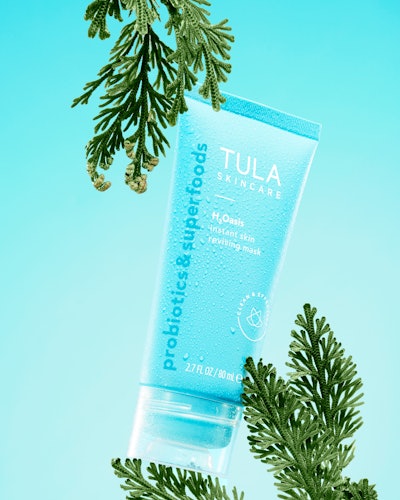 Tula Skincare has launched the H2Oasis Instant Skin Reviving Mask, a 10-minute mask designed to result in a dewy, firm, brightened complexion.Tula
Tula Skincare has launched the H2Oasis Instant Skin Reviving Mask, a 10-minute mask designed to result in a dewy, firm, brightened complexion.Tula
Just as key are solutions that can lock moisture in and strengthen the skin barrier. Symphonic M.D.’s Gluconic Acid :: Coconut PPL Complex Cleanser is a calming, antimicrobial formula targeting dull skin, clogged pores and uneven tone, while stimulating barrier repair and soften skin. Its gluconic acid works to repair the damaged skin barrier, while the phospholipid complex derived from coconut delivers gentle cleaning.
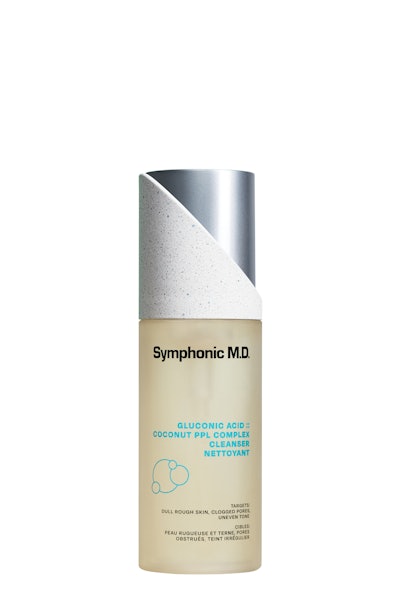 Symphonic M.D.’s Gluconic Acid :: Coconut PPL Complex Cleanser is a calming, antimicrobial formula targeting dull skin, clogged pores and uneven tone.Symphonic M.D.
Symphonic M.D.’s Gluconic Acid :: Coconut PPL Complex Cleanser is a calming, antimicrobial formula targeting dull skin, clogged pores and uneven tone.Symphonic M.D.
“DermalRx HydroSeal is a biofermentation-derived oligopeptide offering incredible skin barrier protection,” says DeGroot. “This yeast-derived oligopeptide is an active ingredient that fortifies the skin’s natural barrier structures. By rebuilding cell-to-cell junctions and stimulating type I collagen synthesis, DermalRx HydroSeal helps to restore the skin’s moisture retention capacity and renew a healthy, youthful appearance.”
Additionally, the ingredient’s hydrating effects make it an apt fit for high-performance moisturization products designed for barrier repair.
Target: Functional Ingredients
Beyond actives, key formulation tools must be aligned with the needs of sensitive skin. For instance, BASF’s Emulgade Verde 10 MS is a sensitive-skin-friendly emulsifier based on polyglyceryl fatty acid ester technology. The material is reportedly biodegradable, based on 100% renewable feedstocks and is COSMOS approved.
The emulsifier provides good stability in O/W creams and lotions and compatibility with commonly used cosmetic ingredients, including both synthetic polymers and biopolymers, per the company. It also provides shear thinning behavior and supports easy distribution on the skin.
Dermatological tests have reportedly shown that it is suitable for sensitive skin and microbiome-friendly concepts.
Consumers Expect Efficacy
Both suppliers and brands will always find it to their benefit to effectively market the proof that their formulations will deliver the desired results, especially for the sensitive skin market.
DeGroot notes, “Consumers are increasingly seeking products with ingredients supported by research and clinical studies, ensuring that their skin care routine is not only gentle but also effective in addressing specific concerns.”
About the Author
LISA DOYLE was formerly the associate editor of Global Cosmetic Industry and is a freelance writer in the Chicago area. Her work has also appeared in Skin Inc., Salon Today, Modern Salon, Master Barber and Writer’s Digest.
Footnotes
ahttps://practicaldermatology.com/news/new-aveeno-report-reveals-71-of-adults-have-sensitive-skin
bwww.wgsn.com/beauty/p/article/645eac8463a9e3884eec1ec7
chttps://drkeirabarr.com/somatic-skincare/



